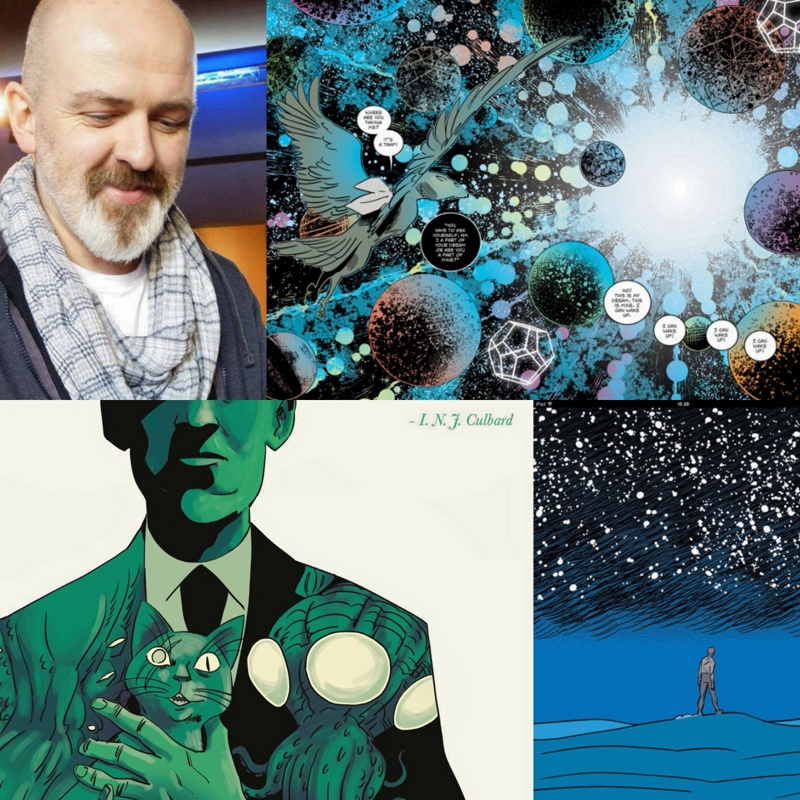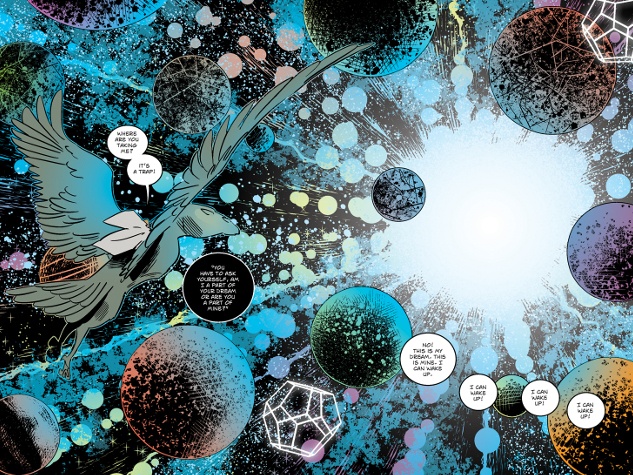In the second of our interviews from Thought Bubble 2017, comics artist and writer I.N.J. CULBARD talks to MARK E JOHNSON about cutting horror writer H.P. Lovecraft, why Tolkien sounds better in Polish and some unexpected influences on his work…

“The first thing I did was I cut the prose out,” I.N.J. Culbard tells me with a grin. We’re sitting outside Leeds Gallery on a Saturday morning, an hour before Thought Bubble’s due to start, discussing his work as a comics artist and writer.
Over the course of his career he’s ranged from fantasy work (Brass Sun, Wild’s End) to science fiction (including his solo graphic novel, Celeste and a recent collaboration with Dan Abnett, Brink) to horror. It’s his work adapting genre classics such as the four Sherlock Holmes novels (with writer Ian Edginton) and various tales by H.P. Lovecraft, that our conversation lingers on, however. It’s the prose of his first Lovecraft adaptation, At the Mountains of Madness, that he enthusiastically cut.
“The first half of the book is just a travelogue,” he says. “It just doesn’t work for a modern narrative, with the way that we pace stories now. So you have to change things up.”
Culbard’s ability to both streamline and humanise the greats of other eras is a big part of what sells his adaptations. He sees parallels between his work and that of prose translators.
“I had this discussion with [a French translator of Lovecraft] saying that it’s purple prose – in English it’s sometimes regarded as pretty turgid,” he says. “But he felt Lovecraft was more gothic. As well as lose, I think we gain in translation, especially when you consider that Baudelaire translated Edgar Allan Poe.”
Culbard’s work, on Lovecraft in particular, is almost an argument for moving work out of its native medium. “My theory is that translation is the same as adaptation. The thing about Lovecraft in other countries is he’s really popular in places like France, Spain and Japan, but it really depends on the translation you get. You take enormous liberties with it. It’s essentially the same as adapting a book, because you’re doing it in a different way.
“I remember as a kid having bits of The Hobbit read to me in Polish, and it’s far more poetic than it is in English. When you consider that Tolkien was a big Beowulf fan, he’d probably have loved those translations of his works. So I’ve always considered that a writer’s job is only half the work when it goes abroad. Then somebody else gets to embellish it. That’s what adaptation’s like.”
Back on Lovecraft, Culbard notes that the author’s novels were serialised, so that each chapter contains a helping of exposition to catch readers up. “So when you cut that out, it’s actually quite a thin book, so it can be translated into comics quite easily as one story.”
Originally, Culbard had pitched an adaptation of The Lost World by Arthur Conan Doyle as a follow-up to his work on Sherlock Holmes, but publisher SelfMadeHero said that someone else might be doing it. “So I said, off the cuff, how about At the Mountains of Madness. I was totally unprepared, hadn’t read it. But I thought drawing snow would be really easy,” he says with a laugh.
Lovecraft’s conservative and often racist worldview presented their own set of challenges. “It’s a shock when you’re reading his stuff. I travelled loads as a kid. He didn’t, he was stuck in his little neighbourhood, so he didn’t have a very broad view of humanity.
“Lovecraft famously wrote, ‘The oldest emotion of mankind is fear, fear of the unknown,’ and to my mind that’s prejudicial thinking, that’s irrational. It is the stuff of horror.”
Where Lovecraft’s strengths lay in writing about the inhuman, about forces and powers that exist beyond the vale of human understanding, Culbard’s adaptations arguably succeed in reintroducing some humanity to the page, animating characters where Lovecraft left them wooden and two dimensional. Discussing the character work in his art, Culbard discusses another kind of adaptation.
“An actor who’s a big influence on all the stuff that I do is Peter Cushing. He’s a prop actor, and it’s really great in a comic if you’ve got someone who’s really doing something,” says Culbard.
Another big influence is Jeremy Brett, though initially that was felt in a work prior to the Holmes books, on The Picture of Dorian Gray. “What’s great about Jeremy Brett is his facial expressions. Acting became a really important element. Especially really physical actors because they’re used to… it’s not over-expressing like a Disney cartoon character with those really ballooned expressions. Really limited, reserved, small expressions are what I really like about actors, where less is more. That idea of having a character who’s very reserved but you push an emotion through that.
“That stuff’s the stuff I really love, and if you can put that stuff into comic books… And all it is, is just the smallest change in expression, but that character really exudes that, then that has a really big effect. All my stuff’s informed by those sorts of performances.”
It’s these inflections, that teasing out of emotion, that give Culbard’s adaptation work the enduring humanity that makes genre classics accessible to a new generation.
Thought Bubble coverage is provided by OK Comics, the comic shop in Leeds. Find them on Twitter or Facebook, and subscribe to their newsletter.

Still hoping to see Ian’s Shadow Over Innsmouth adaptation. I know he’s been ill, his output dropped from massive to hardly anything. Hope he’s recovering ok and we’ll get lots more from him soon.